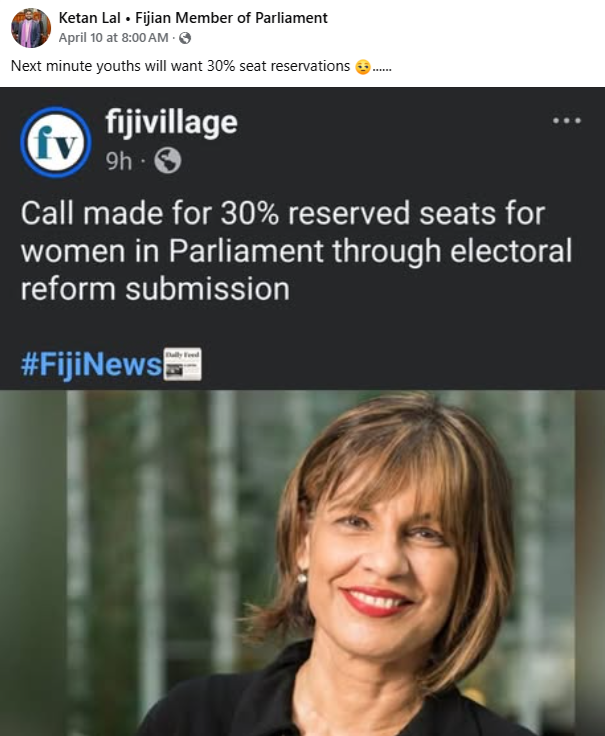Women Activists Slam Ketan Lal's Misogynistic Comments and Grammatical Errors
FIJI NEWS


Women from across Fiji’s diverse political spectrum have strongly criticized minority opposition member of Parliament Ketan Lal for his recent comments on the proposal to reserve 30% of parliamentary seats for women.
Lal shared an article featuring women advocating for the 30% reservation and sarcastically commented, "Next minute youths will want 30% seat reservations."
Imrana Jalal, a prominent Fijian lawyer and human rights activist, immediately called out Lal for his misogynistic remarks.
"You lack knowledge that there is no level playing field. How many votes did you get, by the way? Come on, tell us. whose coattails did you ride in on? Do your research, and you might just be worth debating. With 600 votes, you have no legitimacy to speak on behalf of anyone," Jalal said.
She also raised concerns that a sitting member of Parliament could not get basic grammar correct.
"By the way, Ketan Lal, there is no such word as 'youths.' 'Youth' is both singular and plural," she pointed out.
A vocal supporter of the former FijiFirst Party, Ratika Rachna Pande, also questioned Lal's statement:
"What's wrong with giving 30% to women? When we can look after our house and family, we can look after our nation and Parliament. Plus, there's nothing wrong with giving 30% to people with disabilities. They are often talented too. We are all Fijian citizens with equal rights to be in elections and, if chosen, to serve the people of Fiji," she said.
Another social media user, Meryl Thomas, offered a powerful rebuttal, explaining that the call for 30% reserved seats for women isn’t about handing out positions or opening the floodgates for quotas. Instead, she emphasized the need to recognize that biological women—who make up half the population—have been historically underrepresented in leadership and decision-making spaces.
"The strength of both men and women lies in their different perspectives and lived experiences," Thomas explained. "Women bring invaluable insights into family life, caregiving, education, health, social issues, and the economic challenges that affect households—areas they are often on the frontline of, whether as mothers, workers, or community builders. These are not just 'soft issues'—they are foundational to national development."
She further argued that fair representation is essential for ensuring policies reflect the reality of all citizens, not just half of the population.
"Fair representation between men and women is not about division—it’s about balance. It ensures that decisions made at the highest levels reflect the reality of all citizens, not just half," Thomas said. "Once we’ve addressed this fundamental imbalance, we can have broader discussions about other forms of inclusion—youth, ethnicity, ability, and so on."
"Fairness doesn’t mean everyone gets a quota—it means we first fix the most basic and historic gap in representation. That’s not radical—it’s just common sense."